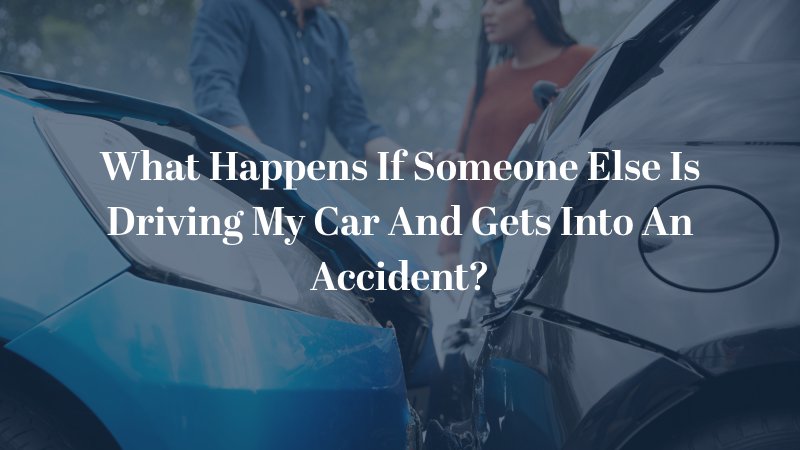
When you entrust your car to someone else and they get into an accident, a mix of insurance issues and legal principles will determine the outcome. Understanding your liability and insurance coverage in such scenarios is crucial because it can significantly affect how you proceed after the incident.
Understanding Washington DC’s No-Fault- Insurance System
Under Washington DC’s no-fault insurance system, drivers involved in an accident must first rely on their own insurance policies to cover medical expenses and related costs, regardless of who was at fault for the incident. This system aims to reduce the number of lawsuits stemming from minor accidents and ensures that injured parties receive prompt payment for their medical bills.
It’s important to note that personal injury protection (PIP) coverage must be offered by insurance companies, but drivers aren’t required to obtain this type of coverage. PIP will cover medical expenses, lost wages, and other related costs up to the policy limits. However, PIP coverage does not extend to vehicle damage; for this, you would need collision or comprehensive coverage.
Additionally, if the damages exceed certain thresholds, or if the injuries are severe, you can still pursue a claim against the at-fault driver outside of the no-fault system. Understanding these nuances is essential for car owners to navigate the aftermath of an accident involving another driver.
Insurance Coverage Basics in Washington D.C.
To understand how insurance works when someone else is driving your car, it’s essential to know the primary types of car insurance and how they apply. Types of insurance include:
- Liability Insurance: Covers damages to other people and their property in case of an accident where the insured is at fault.
- Collision Insurance: Covers damages to your own vehicle in the event of an accident.
- Comprehensive Insurance: Covers damages to your car from non-collision-related incidents such as theft, vandalism, or natural disasters.
Permissive vs. Non-Permissive Use
Understanding the difference between permissive and non-permissive use is crucial when determining insurance coverage for a driver borrowing your car.
- Permissive Use: If you give someone permission to drive your car, your insurance typically covers them under your policy. The driver’s insurance may act as secondary coverage if needed.
- Non-Permissive Use: If someone drives your car without your permission and causes an accident, it can lead to complications, including potential denial of claims by your insurance company.
Liability When Someone Else Drives Your Car
Understanding liability is crucial when someone else is involved in an accident while driving your car.
With Permission
When you give someone permission to drive your car, your insurance policy generally offers coverage to that driver. This falls under “permissive use,” making your insurance the primary source of coverage for any damages or injuries resulting from an accident.
Your liability insurance would cover the costs of damages to other people and their property, while your collision and comprehensive insurance would take care of damages to your own vehicle.
However, if the costs exceed your policy limits or additional coverage is required, the driver’s own insurance may act as secondary coverage, stepping in to cover the remaining costs. It’s important to ensure that anyone you allow to drive your car has a valid driver’s license and is capable of driving safely.
Without Permission
If someone drives your car without your permission and causes an accident, the situation becomes more complicated. This scenario falls under “non-permissive use.” Many insurance companies may deny claims related to non-permissive use, potentially leaving you responsible for the damages.
In some cases, if the driver has their own insurance policy, their coverage might come into play, but this is not guaranteed. It’s essential to report such incidents promptly to your insurance provider and the authorities to clarify responsibility and coverage. Always keep your keys secure and be mindful of who has access to your vehicle to avoid these complications.
When to Seek Legal Help if Someone Caused an Accident with Your Vehicle
Navigating the legal aftermath of an accident involving your vehicle can be challenging. Here are specific scenarios when seeking legal help is advisable:
Disputes Over Fault
If there is contention about which party is at fault for the accident, seeking legal advice is crucial. A personal injury lawyer can help gather evidence, negotiate with insurance companies, and represent you in court if necessary.
Denied Insurance Claims
Insurance companies may deny claims for various reasons, such as a lack of sufficient evidence or policy exclusions. A lawyer can provide guidance on how to appeal the denial and ensure that you receive the compensation you are entitled to.
Serious Injuries or Damages
Accidents that result in significant injuries or extensive property damage often involve complicated legal and insurance issues. Legal assistance ensures all medical expenses, lost wages, and other damages are properly addressed in your claim.
Complex Legal Jargon
Insurance policies and legal documents are often laden with complex terms and conditions. A legal expert can help you understand these documents, safeguarding your rights and interests throughout the process.
Potential Lawsuits
In some cases, you might face a lawsuit from another party involved in the accident, or you may need to file a lawsuit to recover fair compensation. Legal representation is crucial for building a strong case and achieving a favorable outcome.
Navigating the intricacies of an accident involving your vehicle can be daunting, but with the right legal support, you can protect your interests and ensure a fair resolution.
Contact a Lawyer For Help After an Accident Involving Your Vehicle
Allowing someone else to drive your car comes with significant responsibilities and potential risks. Understanding Washington DC’s insurance system, the implications of different types of insurance, and the steps to take following an accident can help mitigate complications. By staying informed and proactive, you can navigate these challenges more effectively.
If you find yourself dealing with a complicated car accident scenario, don’t hesitate to seek professional legal advice from a Washington D.C. car accident attorney. Contact us today to schedule a free consultation.